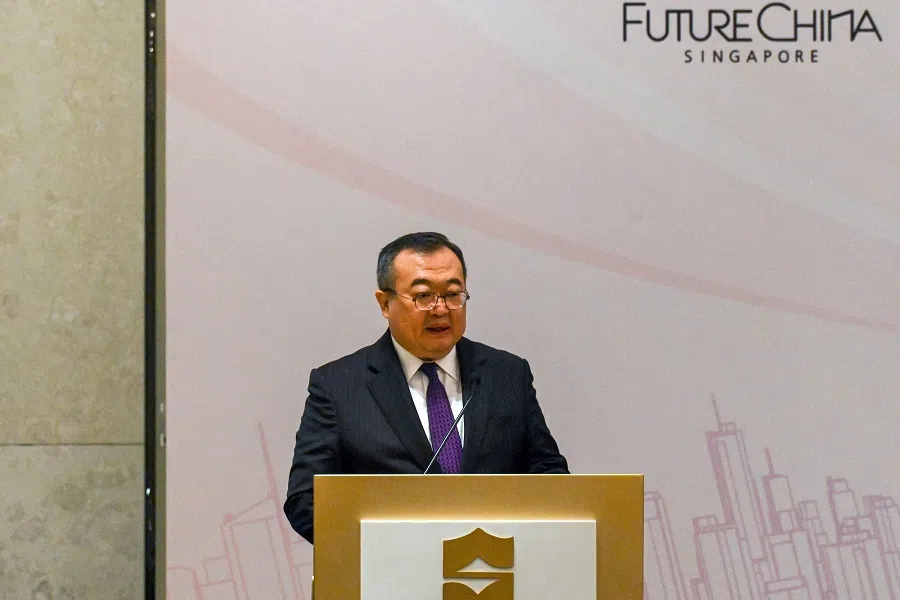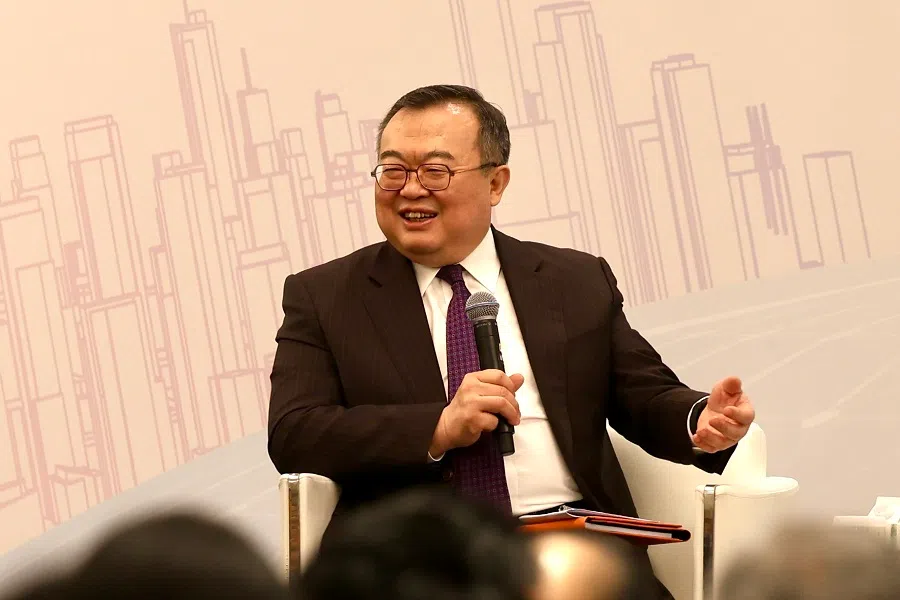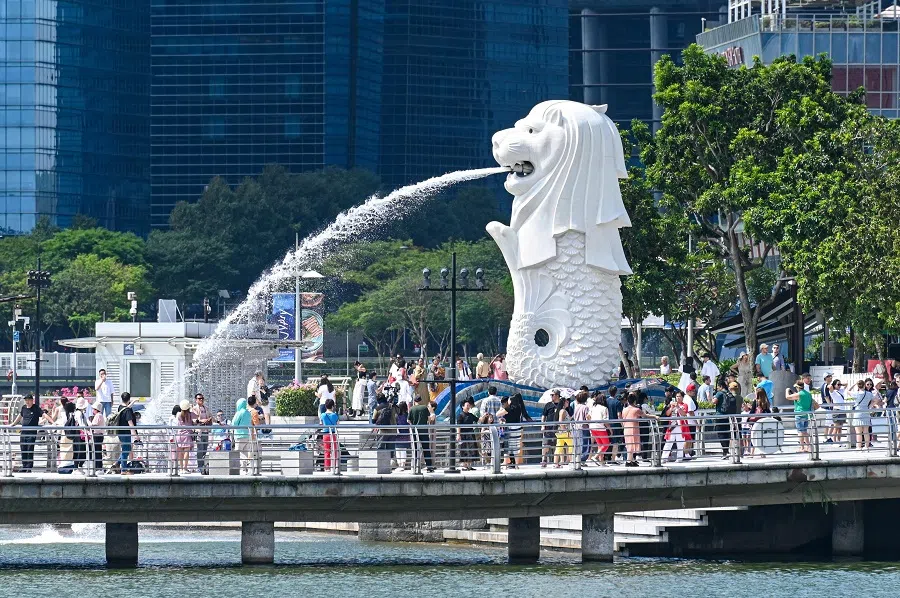China's Liu Jianchao shows his tact in communicating with the outside world
In a dialogue hosted by Business China, Lianhe Zaobao and ThinkChina this week in Singapore, senior Chinese diplomat Liu Jianchao showed his skill and eloquence in responding to tricky questions about China. Lianhe Zaobao correspondent Yang Danxu gives us the highlights of the session.

Over the course of a one-hour forum, occasional bouts of lighthearted laughter were heard erupting from the hall. Liu Jianchao, dubbed by some Western think tanks as the "shadow foreign minister", communicated with the audience in a manner not usually adopted by Chinese officialdom, launching a charm offensive on the forum's participants.
Gentle yet firm manner
Liu, director of the International Liaison Department of the Chinese Communist Party, is visiting Singapore this week. On 27 March, he attended the FutureChina Dialogue, an event jointly organised by Business China Singapore, Lianhe Zaobao and ThinkChina held at Shangri-La Singapore.
In dealing with the questions posed by the host, media veteran and editor-in-chief of SPH Media's Chinese Media Group Lee Huay Leng, this experienced Chinese diplomat doled out a repertoire of puns, rhetorical questions and even self-deprecation, handling the questions in a gentle yet firm manner.
External observers lack confidence in China's economy, while China's approach in handling issues make it even more difficult for others to predict what would come next - how then can China win back the confidence of investors? Lee sparked off the dialogue by posing this question to Liu.
Liu was quick-witted in referencing the Mandarin name of the FutureChina Dialogue (慧眼中国, lit. looking at China with a discerning eye), linking it to the same Mandarin character (慧) in Lee's Chinese name. He said that "one must look at China with a discerning eye" and jokingly adding that it means "to look with Huay Leng's (慧玲) eyes!"
He circled back to the topic and explained that "a discerning eye means to be unique", reminding that if everyone's perspective on a matter stems only from one angle, they may draw an inaccurate observation.
... the issue of language should be seen through the lenses of its political environment.

During the question and answer session in the latter part of the dialogue, Liu once again hinted against following the opinion of others when it comes to the issue of China, saying that the Western perspective, no matter how influential, would not necessarily be representative of the global perspective. Thus, there is a need to have a keen eye and sharp mind to analyse and perceive the issues discussed by the so-called international media.
Understanding the language in China's context
On the issue of China's communication with the external world, Lee raised that much of China's choice of words makes it distant from the rest of the world, and that to understand China would mean having to read between the lines, resulting in foreign readers often "understanding the words but not the meaning". Participants laughed seemingly in agreement.
Liu took a pause, with a hint of helplessness on his face, before throwing the question back at Lee, skilfully deflecting it with a smile: "What should we do then? Should Singapore send more students to study abroad in China?"
His response once more drew laughter from the audience.
But Liu was quick to offer a serious reply, saying that all countries have their own political environment, and that China's own political environment, language and structure - in effect the "Chinese characteristics" so heavily delineated by China - encompasses its socialist market economy, Chinese-style modernisation and so forth. So the issue of language should be seen through the lenses of its political environment.
The diplomat, who is fluent in English, then changed tack and said, "Even though I have been learning English for a very long time, there are times when I might not fully understand Western languages."
While he was not overbearing, Liu's response implied, can the West take it seriously when it comes to learning about China's context?

Liu stated that China does not reject advanced things from other countries, and would not refuse to learn from others, including learning about Western economic and social terminologies.
He added, "Other countries could also try to put themselves into China's context to learn; this would help in understanding and in boosting confidence in China."
Hence, where does the problem lie on the issue of China communicating with the external world? While he was not overbearing, Liu's response implied, can the West take it seriously when it comes to learning about China's context?
However, Liu also admitted later that it can sometimes be hard to compare between Mandarin and foreign languages, adding that "at times, translation can make it even more confusing" as it could be even more difficult to understand or more intense.
Liu, who is actively expanding party-to-party interactions and external work for the International Liaison Department, said that it is very difficult to be free of China's linguistic system, but the department would spare no effort in explaining China's policies as clearly as they can.
Allowing the dialogue to continue
This is the second time that Liu held in-person interactions with a foreign audience this year since his trip to the US in January, when he participated in a forum organised by US think tank Council on Foreign Relations.

Throughout the session, Liu avoided using obfuscatory officialese, and when faced with a leading question by the host on "whether it is natural for a director to move on to work in the foreign ministry" - alluding to Liu's potential next posting - Liu gave a response off the cuff as well.
But the true meaning of communication was never to "win over" anyone, and even more so, it is never about issuing dictums in a top-down manner.
From his speech to the dialogue and to the question and answer session, Liu switched seamlessly between Mandarin and English, while also frequently touching on Singapore-China relations in addressing the local audience.
He also quietly criticised the US without directly mentioning it with regard to the sanctions against Chinese technologies and its interference in the South China Sea situation, while also shedding light on concepts such as the Chinese-style modernisation and new quality productive forces.
Liu even self-deprecatingly stated that the task of communicating is a tall order, and that "if today you realise that even after hearing from me Liu Jianchao, you are still unclear about things, I am to blame".
At the conclusion of the hour-long activity, were the 400 participants won over by Liu? It is not likely. But the true meaning of communication was never to "win over" anyone, and even more so, it is never about issuing dictums in a top-down manner. Instead, it is about allowing the dialogue to continue, about preserving harmony even amid differences.
From the bursts of laughter heard during the dialogue, through this short interaction, Liu was able to deliver his message to the participants. Moreover, all could sense the sincerity and openness that this top Chinese official exuded in communication.
This article was first published in Lianhe Zaobao as "刘建超的沟通艺术".





